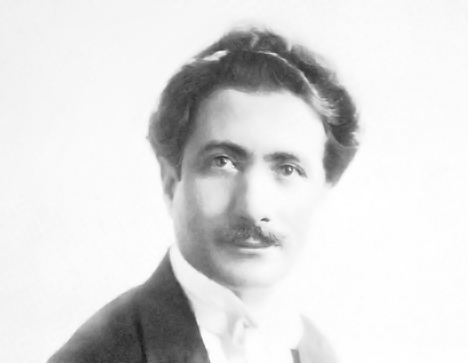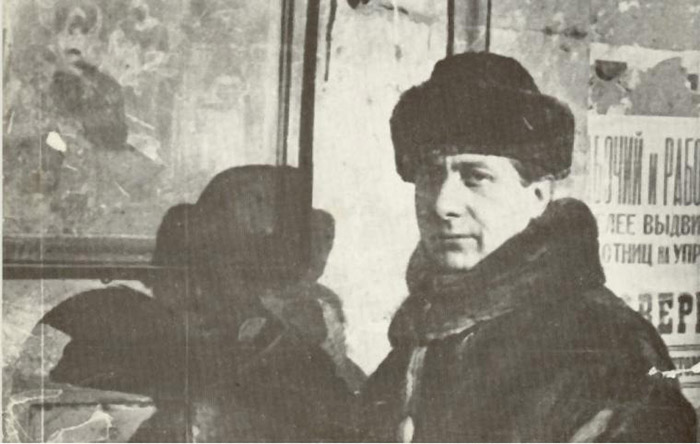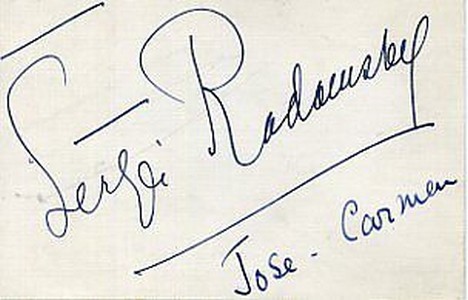Sergei Radamsky (his own transliteration) was born into a Ukrainian-Jewish family in Łódź (now Poland, then part
of the Russian Empire); the date of his birth is usually given as 1890, Wikipedia says on September 15th, but according to his own
autobiography, he was 34 in February 1923, so he must have been born in 1889.
Already as a teenager, he participated in the 1905 revolution, whereupon he remained on the radar of the tsarist secret service,
eventually resulting in his flight from Russia in 1908. He went to Vienna and then to Alexandria (Egypt), surviving with occasional
jobs, and in 1910, he emigrated to the USA, where he was a sewer in a New York City textile factory – and regularly homeless
during his first years in America.
His factory colleagues talked him into taking voice lessons because they liked his singing; of
course, he didn't have the money for serious studies and had to choose his teachers (and he tried many of them) according to their
fees and not their quality. That made for a difficult start; he had no top notes and lots of technical problems, and he was often
about to throw in the towel and remain what he still was during working hours, a sewer. Finally, one of those teachers (a Russian-born
tenor called Henri Barron) found him a first job in the choir of the Aborn Opera Company, where he also sang comprimario parts; his
debut was as Ruiz and Messenger in Trovatore, and it was far from successful.
By chance, he then got to take voice lessons with famous Italian basso Giovanni Gravina, and his voice got steadier. In 1914, he had
his first concert in New York, it was a success, and he got a comprimario contract at the Century Opera House; after a smooth start
as Beppo in Pagliacci, however, he was again a failure, and was relegated to the choir.
When his contract ended, he was determined to return to his sewing job, but when a low-budget vaudeville show on Broadway searched
for someone who was able to imitate Enrico Caruso, he got the job, and was a considerable success – so considerable that Caruso
himself heard about it, and invited Radamsky to present him his act. In his (more anecdotic than documentary) autobiography, Radamsky
says Caruso was very friendly with him, and gave him good advice on his vocal technique – above all, not to try and sing like
himself, or it would ruin his totally different voice.
Radamsky quit his vaudeville contract, and found a new teacher in Boston, a Catalan called Ramon Blanchard (not the famous baritone
Blanchart), who gave him lessons in exchange for his services as a male housemaid. Radamsky stepped in for a sick tenor in a student
performance of Gounod's Faust in a small New York theater, simply skipping the high C in Salut, demeure chaste et pure –
a note that he didn't simply have available. That was in 1917, and Radamsky considered it the real start of his career, which slowly
picked up pace – not in theaters, though, but in concert cafés and also in "real" concerts.
In 1923, he tried to obtain US citizenship. The authorities hesitated as he was considered a communist; not without reason: he thought of
himself as a socialist, and had obvious sympathy for the Russian October Revolution, and the young Soviet Union. But in the end,
he got citizenship nonetheless.
In February 1920, he gave a concert at Aeolian Hall in New York, and it was successful enough to secure him a contract to sing Faust
and Turiddu in Philadelphia. Another Aeolian Hall concert followed in November 1921. For a certain period, he was associated with
wealthy music lovers in New York, and sang at their private events; his political leanings put an end to that when at one of those
parties, he got into a heated argument with the manager of Brooklyn Rapid Transit, who spoke very contemptuously of his workers who
were on strike for wages that would have allowed them to sustain their families. The manager said their families were of no concern,
the workers only needed to earn enough money for themselves, and if they dared joining the communists, they'd be shot like dogs
"since after all, we're not in Russia". Radamsky chimed in and told the manager, "You're right, we're not in Russia. In Russia, you'd
be the one who'd be shot like a dog, and justly so." That was it with his high society affiliations.
But he got a contract to sing operatic arias to the accompaniment of a symphony orchestra at the Rialto on Broadway, and the fee he
earned allowed him to visit his parents in Łódź for the first time since his emigration, and to go to Italy for
further vocal studies (with Arturo Vita in Milano) in February 1923. He loved the country, but soon felt uncomfortable about the
political situation – the Fascist government under Mussolini had taken power the year before. He made friends with Aureliano
Pertile, who was an antifascist, as well. And finally, he got a contract to
sing Edgardo and Almaviva at the tiny (and semi-amateurish) provincial theater of Magenta.
Back to New York, he declined an offer to become a comprimario at the Met; instead, he sang Grigorij and Sinodal with a Russian troupe
in Montreal. It was a failure: the first evening, his poorly made denture broke on stage, and without teeth, he was hardly able to
sing through the end. Back to the USA, he joined an itinerant troupe that was to stage Barbiere with Shaljapin, but he quit soon
since he felt poorly paid (150 Dollars per evening as compared to Shaljapin's 3000), and found Shaljapin intolerably arrogant.
He helped the composer Hall Johnson form America's first classical black choir, which was perceived, at the time, as scandalous
enough for a white musician that not only the police but even New York mayor Fiorello LaGuardia intervened with Radamsky; of course,
as a true leftist, Radamsky stood by his antirascist conviction, and Johnson's choir became a huge success.
All of a sudden, in 1927, Radamsky became a star. Novelist Theodore Dreiser, a noted US socialist, had been invited to the Soviet
Union; he prompted the Soviets to invite also his personal acquaintance, Sergei Radamsky. They did; a Russian emigree with American
citizenship and nonetheless with sympathy for the Soviet Union must indeed have been tempting for them. Radamsky's first USSR concert was
at the Moscow Conservatory; it was a mixed aria-and-lied program, and he dared singing Rachmaninoff. That was a big no-no
since Rachmaninoff was an enemy of the Soviet Union, but Radamsky was just as stubbornly principled there as on the other side of the
ocean and did what he deemed the right thing to do. It was accepted, and he sang further concerts and also on the radio.
Immediately the same year, he was back for a second USSR tour, during which he also made records – the first foreigner ever
recorded in the Soviet Union. This time, he sang not only in Moscow, but also in Saratov and Nizhnij Novgorod.
Back home, he got what was the most important operatic contract of his career: Andres in Berg's Wozzeck in Philadelphia, under the
baton of Leopold Stokowski – a big success for everyone, including Radamsky.
The next nine years, until 1936, Radamsky divided his time between the USA and the USSR, with increasing prevalence of the latter. He
sang in many part of the huge country – in Georgia, Azerbaijan, Armenia, throughout Siberia on a long tour organized by the
Red Army, and even in the recently founded Jewish Autonomous Region Birobidzhan in Siberia's far east. In 1932, he gave a concert in
Moscow with a New York jazz band (!). All in all, he gave about 200 concerts in the USSR in those nine years. Beyond singing, he was
kind of a correspondent for the US Communist Party's newspaper "Daily
Worker". He tried to be kind of a cultural ambassador between the two hostile powers, and many times even successfully so, fueling a
certain amount of cultural exchange.


